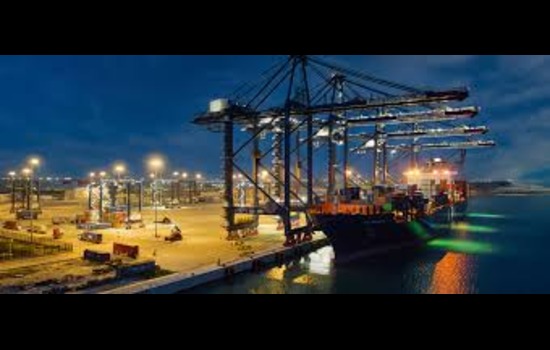Lekki deep seaport begins transshipment to Ghana, Côte d’Ivoire, Togo
Nigeria’s first deep seaport, Lekki Port, has announced commencement of transshipment operations to some ports in neighboring Togo, Ghana and Abidjan in Côte d’Ivoire.
Addressing reporters in Lagos Thursday, Mr. Daniel Odibe the Deputy Chief Operating Officer said that the port also carried out a trial transshipment within Nigeria to Onne Port recently.
According to Odibe: “We had our first transshipment operations in 2023, which is the first in the Nigerian economy.
Similarly, the firm disclosed that the $1.5 billion seaport has concluded plans to ramp up operations from 287,000 Twenty-foot Equivalent Units (TEUs) handled in 2024 to 500,000 TEUs by the end of this year. He said out of 1.2 million TEUs capacity, the port is currently handling only about 20 per cent of its projected cargo throughput.
According to Odibe, the Port is still targeting more international transshipment cargos from other West African countries.
“Before now, countries like Togo, Ghana, and Côte d’Ivoire used to be the transshipment hub for Nigerian-bound cargoes. You know what that means for our cargo? They spend more time coming to us. They incur more costs because they are double-handled in those transshipment hubs, all because Nigeria didn’t have a deep-sea port.
“So, commencement of operations at Lekki Port changed the whole transshipment story. The story is in our favour right now. We are now talking about international transshipment. We are now doing international transshipment to other West African countries such as Ghana, Côte d’Ivoire, Abidjan, Togo and Cotonou.”
The port, he said, intends “to expand to the rest of Africa. But most importantly, we hope to expand the local transshipment. Currently, you have ports like Warri, Calabar, Onne, and then we have inland ports like Onitsha and Burutu. Some of these ports foreign vessels don’t go there because the draft is low. So, the idea here is to have cargoes for those ports. That will open up economic opportunities in those areas.
“We did some trials last year with Onne. It had some challenges, but again, it was an eye-opener and we are looking at restarting that again this year in collaboration with the shipping lines and baggage operators.”
On cargo throughput volume, Odibe explained that cargo volumes are now gradually improving as it processed 222,000 TEUs between January and June 2025.
He added that “Lekki Port currently receives between 10-12 vessels every month. We are picking up because Naira is gradually stabilising.
“Volumes fell because of Naira depreciation and the removal of fuel subsidy, and this caused a setback in our projection. As of 2023, when we started operations, we did 54,289 TEUs, and as of June of this year, we have done 222,000, and we are projecting 500,000 TEUs.”
Odibe also stated that the vessel turnaround time at Lekki Port currently stands at 48 hours as against one hour and 25 minutes for truck turnaround time, while cargo dwell time is 16 days.
He attributed the shortfall to prevailing economic challenges that have impacted the port’s operations in recent times.
According to him, the removal of fuel subsidies and the depreciation of the Naira against major foreign currencies have led to a decline in imports.
He, however, noted that cargo volumes are now gradually improving as it processed 222,000 TEUs between January and June 2025.
He added that transshipment activities to ports in neighbouring and landlocked countries have similarly increased.
According to him: “Lekki Port currently receives between 10-12 vessels every month, and Lekki Port transshipment operations have also increased substantially.
Lekki port, he said, “is currently doing international transshipment to Togo, Benin Republic, Ghana and Abidjan, and some landlocked countries. We are picking up because the Naira is gradually picking up.
Volumes, he said, “fell because of Naira depreciation and the removal of the subsidy, and this caused a setback in our projection. As of 2023, when we started operations, we did 54,289 TEUs, and as of June of this year, we have done 222,000, and we are projecting 500,000 TEUs.”
According to him, the vessel turnaround time at Lekki Port currently stands 48 hours as against one hour and 25 minutes for truck turnaround time, while cargo dwell time is 16 days.
Also, Managing Director Chief of the Port, Wang Qiang, said that Lekki Port will continue to raise the bar to international standards.
Wang, who was represented by Chief Operating Officer of the port, Young Qiang said: “We continue to push the envelope, set the bar higher to uphold our position as West Africa’s deepest sea port.
“The result of our unrelenting commitment to world-class standards is visible in the gigantic footprints we are putting on the map of maritime trade in Africa, deploying technology, driving operational efficiency, and shaping regional trade,” he said.



